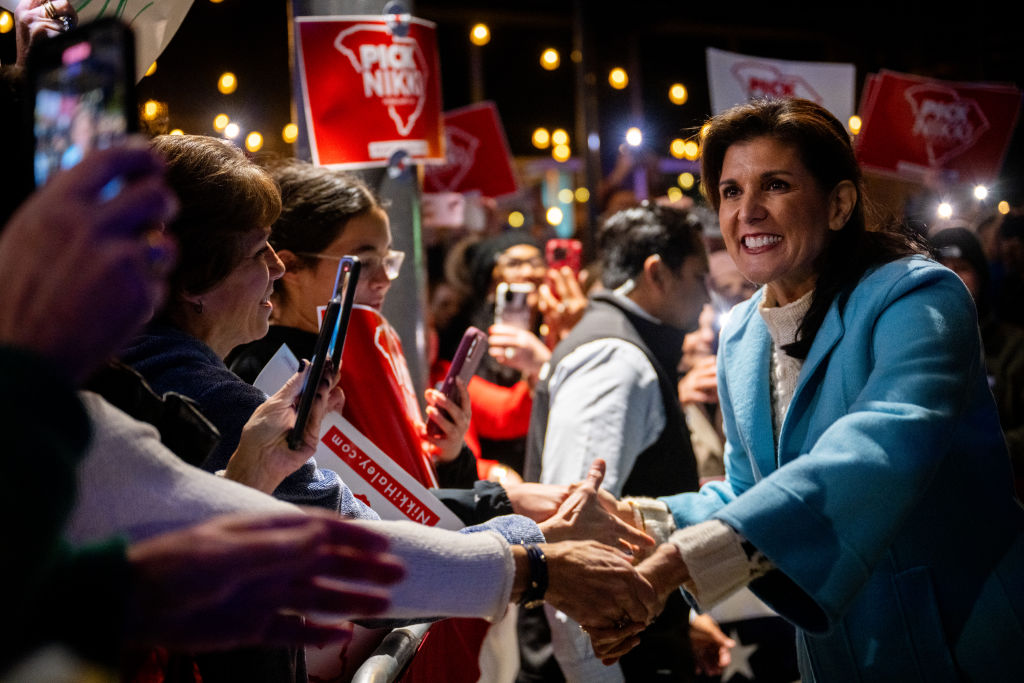South Carolina may be Nikki Haley’s home state, but all signs say it’s Trump Country.
The former President is leading Haley by more than 30 points there, according to polling averages calculated by 538. Nearly all of the state’s Republican officials have endorsed the former President over their former governor, including Gov. Henry McMaster, Senators Lindsey Graham and Tim Scott, and five of the state’s six U.S. House members. Trump’s campaign has enlisted thousands of volunteers to barnstorm the state ahead of the Feb. 24 primary.
To that end, Trump is gunning to make South Carolina the official death-knell of his last remaining primary opponent. While Haley insists she’ll stay in the race through Super Tuesday on March 5, when more than a dozen states will hold primaries, the Trump campaign is determined to make those plans untenable. By eviscerating Haley in the state she once led, his allies say, Trump can bury his rival and shift fully to the general election. “This is where a lot of campaigns are ended,” says Rep. Russell Fry, one of the South Carolina lawmakers who endorsed Trump.
Haley is putting up a fight. Her campaign raised more than $16 million in January alone, as she’s been intensifying her attacks against the former President. Over the weekend, Haley, who served as Trump’s U.S. Ambassador to the United Nations, appeared on Saturday Night Live to castigate his candidacy, saying he should have to take a mental competency test. His courtroom obligations over the coming months, she went on, would damage his ability to oust President Joe Biden. Simply put, she’s no longer pulling punches.
“Nikki has won statewide in South Carolina not just once but twice before,” says Olivia Peras-Cubas, a spokesperson for the Haley campaign. “While she’s crisscrossing the state earning every vote, Trump is running a basement campaign because he’s too scared to debate Nikki and answer the tough questions.”
Despite months of campaigning and tens of millions of dollars spent by Haley and others, Trump has maintained a commanding position with the GOP electorate. He’s the first non-incumbent Republican presidential candidate ever to win both the Iowa caucuses and the New Hampshire primary. Cementing a landslide victory in South Carolina would likely foreclose any path forward for Haley and set in motion the longest general election cycle in American history.
South Carolina has historically served as a kingmaker for GOP primaries. Nearly every Republican candidate since 1980 who won South Carolina went on to capture the party’s nomination. The only exception was in 2012, when Newt Gingrich won the state but ultimately lost the nomination to Mitt Romney.
Haley has set a lower benchback for success: 43%. That’s the vote share she drew in New Hampshire against Trump’s 54%. Yet the current polling suggests she might fall short of even that relatively modest goal.

Trump’s power over South Carolina’s Republicans is without precedent. “I've never seen anything this dominant,” says Robert Oldendick, a politics professor at the University of South Carolina. While Haley was a popular governor who won reelection handily in 2014, she’s been unable to compete with Trump’s sway. “People here have positive feelings about her,” Oldendick adds, “but what we’ve seen is the hold that Trump has on voters.”
Between Trump’s polling dominance and firm grip on Republican officials, his campaign has billed his ascent as a foregone conclusion. That strategy has succeeded at fending off most potential intra-party challengers, but Haley has remained defiant in the face of Trump’s march toward the nomination.
Last month, Trump ferried a brigade of South Carolina Republicans who endorsed him over Haley to New Hampshire ahead of the primary. “We brought them to New Hampshire to show Nikki Haley that she was not only going to lose in New Hampshire, but she should think wisely about whether or not she wants to be embarrassed in her own backyard,” says Karoline Leavitt, the Trump campaign’s press secretary. “Turns out, she’s not very wise.”
Few Republican insiders see a way for Haley to wrest control of the GOP away from Trump, especially if she loses South Carolina decisively. Some think she’s banking on Trump’s legal woes to hobble him; the former President is facing 91 felony indictments in four separate jurisdictions. But it’s unclear how many of those cases, if any, will come to trial before the election. Most constitutional scholars say that even a conviction would not disqualify Trump from serving as the party’s nominee, though some recent polls suggest he would hemorrhage support over it.
“She can continue campaigning for as long as she wants and as long as she has money,” says Larry Sabato, an elections expert who runs the University of Virginia Center for Politics. Haley’s long-term endgame, he adds, may be to position herself to run again in 2028. “If Trump loses in November, there will be a lane for somebody who can say ‘I told you so.’”
For now, though, Haley is putting all of her energy into South Carolina. She won’t be competing in Thursday’s Nevada caucuses, which will award all of the state’s delegates at this summer’s Republican National Convention. Instead, she’ll be on the ballot in a separate primary on Tuesday that will count for nothing.
In MAGA World’s eyes, it’s a metaphor for the inevitability of Trump’s triumph. “President Trump is the nominee,” says a Trump campaign aide. “Nikki Haley will not even be a thought in people's brains come November.”
More Must-Reads from TIME
- Donald Trump Is TIME's 2024 Person of the Year
- Why We Chose Trump as Person of the Year
- Is Intermittent Fasting Good or Bad for You?
- The 100 Must-Read Books of 2024
- The 20 Best Christmas TV Episodes
- Column: If Optimism Feels Ridiculous Now, Try Hope
- The Future of Climate Action Is Trade Policy
- Merle Bombardieri Is Helping People Make the Baby Decision
Contact us at letters@time.com